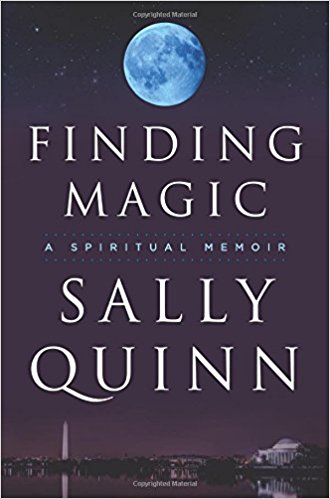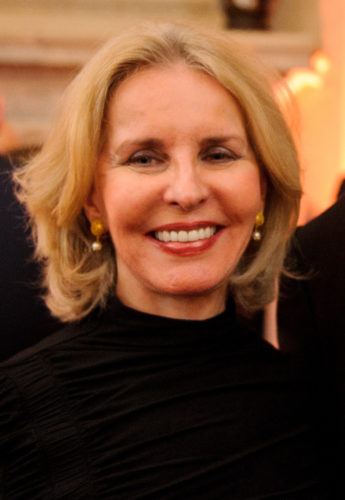 Finding Magic: A Spiritual Memoir by Sally Quinn. Published by Harper One (416 pages).
Finding Magic: A Spiritual Memoir by Sally Quinn. Published by Harper One (416 pages).
“There was always a part of me that could not deny the psychic energy I had been brought up with and the magic I believed in.” – Sally Quinn (p. 119)
In September, HarperOne publishers, an imprint of HarperCollins, released Sally Quinn’s book Finding Magic. Quinn is a respected journalist, author, television commentator, and Washington insider, who eventually helped to launch the Washington Post’s religion site On Faith. The book is a memoir tying various aspects of her life’s journey together with a search for meaning, more specifically deep, spiritual meaning.
In the wake of recent mainstream attention to and often criticism of magical practices, Quinn’s open admission to practicing magic and to having occult interests fed the media response on the initial release of the book. Predictably, she is accused of lying to her readers and dabbling in the “dark arts,” to which there is apparently no defense.
Putting aside some reviewers’ disrespectful insistence of mixing of Rowling fantasy with a woman’s religious reality, we have in this book an interesting journey – one that is complex and not unlike many of our own.
Quinn begins her story in childhood. She grew up in the deep south during segregation, a point she illustrates clearly. It is during this time that she was first exposed to magic, through both her own family and the people around her.
“I began to see the power of the mystical, the mysterious, and the magical. I had a glimpse of the spiritual as a possible substitute for religion – unorthodox as what I was seeing and feeling may have been.” (94)
Quinn was exposed regularly to both traditional Scottish mysticism and to Voodoo practices. The exposure wasn’t separate from her daily life; it was part of it, accepted and respected. Magic just was. The people around her, including her mother, spoke to spirits and to ancestors; they read palms and tarot, and performed magical rituals with herbs and oils.
They also hexed. And this was Quinn’s normal.
This unique upbringing followed her through her travels as a child in a military family, and then into adulthood. Her natural embrace of the occult even touched her professional career as a celebrated journalist.
“Astrology has always helped me in dealing with family, friends, bosses, and coworkers, but never has it been as useful as when I am interviewing people, particular doing profiles.” She writes that she always looks up a person’s sign before seeing them, and it “generally gives [her] a huge advantage.” (p 199)
Quinn also openly discusses her hexing actions and those of her family members, but she does so within the context of moral complexity. The hex acts that she performs, as she writes, came out of anger, frustration, and fear, but the ramifications of her assumed successes left her unbalanced and feeling guilty. In fact, when her son is born with a serious medical condition, she wonders if his illness was a punishment for that magical work.
“I still don’t know whether I believe in hexes or not,” she writes. “All I can say is that there always seemed to be some cause and effect. If ever there was the slightest chance I had been the cause of someone’s demise, I didn’t see how I could live with the guilt. Never have I regretted anything more. I wanted to apologize, to ask for forgiveness of the victims and the families, but I was too ashamed.” (p 230-1)
Finding Magic is littered with that type of back-and-forth moral pondering. Quinn asks difficult questions such as: Is there a god or gods? Does ritual matter? If so, why? What is religion?
She never answers these questions for the reader. “Most of us are looking for the divine in our lives, searching for meaning and magic. Most important, almost all of us are looking for love, in its many manifestations,” she muses. (402)
What Quinn does provide is a personal navigation through her own life’s meditation, and in doing so, she demonstrates that the answers often change as experience ebbs and flows. What one believes today, may change tomorrow. Acceptance of that fact is an important key to finding spiritual peace.
“One of the many things I’ve learned is that you can’t seek happiness to find meaning. You have to seek meaning to find happiness. To find meaning is not simply transcending the self; it’s transcending the moment.” (403)
Throughout the book, Quinn details her unending search for a genuine religious experience. She repeatedly confesses that she has hungrily sought the ecstatic experience, the moment that deity speaks, or a true and deep knowing in a definitive faith practice.
She admits to failure on many occasions. Until the end of her story when she describes how she found that desired religious meaning in love, the overall spiritual experience, and the varied rituals of life.
Interestingly, her repeated failure to locate that intense spiritual moment or path may confound some Pagans who practice magic as part of ritual and religion. Quinn admits to an absolute belief in magic and often practices rituals associated with the occult, but she doesn’t report exploring any Pagan path.
However, based on her writing, she does not necessarily equate magic with religion in that direct way. This fact is not surprising considering that, in many cultures even today, magic is practiced without being associated specifically with religious belief. It just is.
 Throughout Finding Magic, Quinn recalls many instances in which the magical touches her in ways that might sound familiar to a Pagan reader. In one instance for example, she walks a labyrinth meditation. When she does so in a group, it means nothing, but then when she returns alone and has the ecstatic experience.
Throughout Finding Magic, Quinn recalls many instances in which the magical touches her in ways that might sound familiar to a Pagan reader. In one instance for example, she walks a labyrinth meditation. When she does so in a group, it means nothing, but then when she returns alone and has the ecstatic experience.
“For a long time I kept my eyes closed, Then I looked up. What I saw astonished me. It seemed to clarify everything that I was wondering about. I hadn’t noticed before but right in front of me, surrounded by the oaks, was a magnificent evergreen tree with wide-spreading branches that seemed to be embracing me.”
In that meditative state at the center of the labyrinth, she connected to the spiritual, got answers, and felt empowered. “That walk changed my life,” she writes. (238-9)
While Quinn reports that she is drawn to religion and also clearly to magic, Quinn did not, according to the memoir, explore the religious communities that put magic front and center, make it religion in and of itself, or use it without reserve or stigma. If she did, she does not talk about it in the book. Her discussions of religion focus predominately on her exploration of Christianity, Islam, Judaism, and other more well-known world faiths.
It is not until the very end that Quinn even mentions the existence of a modern Pagan religion, let alone one of the many indigenous world practices that embrace magic. “Wicca is a relatively new religion that is ritualistic and can emcompass all beliefs, some, or none. The basic tenet is the code or what is called the Wiccan Rede: ‘An it harm none, do what you will.” Sounds pretty reasonable to me.” (399)
That point is not a negative, but rather a curiosity, considering Quinn embraced occult practices so readily.
In the end, Finding Magic is not about Quinn’s finding religion, but rather her search for spiritual meaning. The title of the book is somewhat of a misnomer. She isn’t searching for magic. She had it the entire time, but maybe that’s the point.
Like Dorothy in The Wizard of Oz, Quinn had the power “to go home” her entire life, but she had to search inside of herself and make the big journey in order to realize it.
Finding Magic demonstrates the search for meaning – one with no end and no clear answers. And meaning can be magic, in a poetic sense if not in practice.
With all of that said, Quinn’s spiritual journey is only one facet of the Finding Magic, and it serves to tie together the meat of the story, so to speak. The book is also walk through history, from her living in the segregated south and as a military child to the Korean and Vietnam war eras and much more. It is history alive.
Quinn skillfully recounts her experience as a woman journalist in Washington, and she passionately remembers her life with Ben Bradlee, longtime executive editor of The Washington Post.
Finding Magic is as much a love story, a career woman’s struggle, and a mother’s pain as it is a spiritual journey. What makes the book interesting is not any one of those particular pieces, but rather how magic, quite literally not as allegory or poetic symbolism, weaves its way through her journey.
Magic is the vine, or better yet the rope, that she seems to hold on to in order to ground her search for meaning.
When she was originally asked to write this memoir, Quinn was reportedly only suppose to share her life with Bradlee, who died in 2014. However, as she began writing, the book turned into something far greater – her own story.
Finding Magic is a well-written, honest march-through-time from Quinn’s personal lens of spirituality, religion, motherhood, feminism, and love.
“I believe that life inherently has great meaning, potentially for everyone … If I had to choose one word for where I am spritually at this moment in life, it would be transcendentalist.” (397)
The Wild Hunt is not responsible for links to external content.
To join a conversation on this post:
Visit our The Wild Hunt subreddit! Point your favorite browser to https://www.reddit.com/r/The_Wild_Hunt_News/, then click “JOIN”. Make sure to click the bell, too, to be notified of new articles posted to our subreddit.